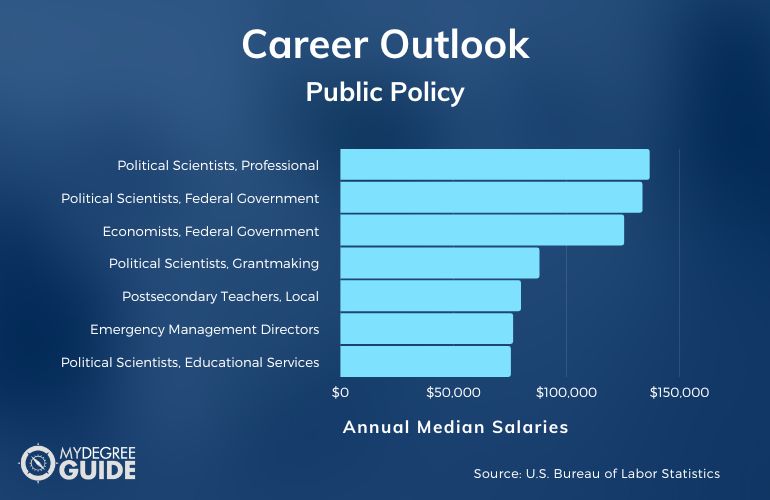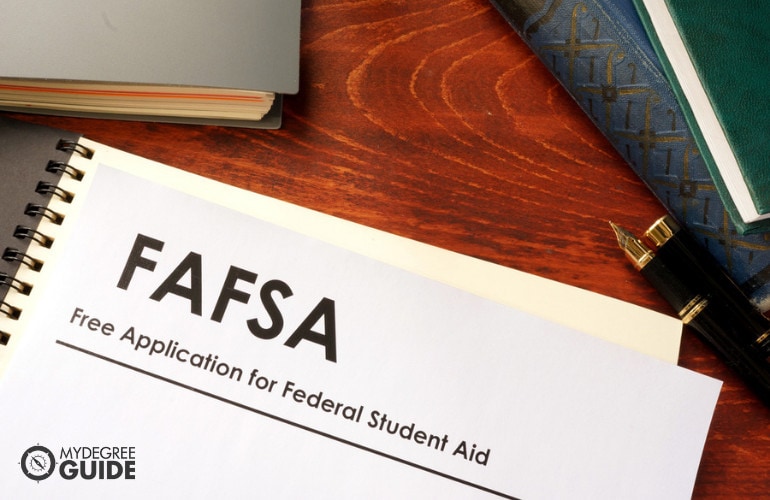Earning an online masters in public policy may be a strategic path for you if you take an interest in social change, economics, and the political economy.

You may also consider this degree if you want to participate in the development of laws and regulations that may impact your local community. An MPP degree may lead to an exciting career working on policy at a national or international level.
Editorial Listing ShortCode:
Career options in the field are broad and generally come with a higher than average annual salary and positive job growth.
Universities Offering Online Master’s in Public Policy Degree Programs
Methodology: The following school list is in alphabetical order. To be included, a college or university must be regionally accredited and offer degree programs online or in a hybrid format.
American Public University
Obtaining a Masters in Public Policy from American Public University ensures students are prepared for a career in designing and evaluating policy at all levels. By teaching students to use critical thinking skills to tackle real-world issues, APU’s MPP gives students the skills to conduct research, analyze data, and communicate effectively.
APUS is accredited by the Higher Learning Commission.
American University
American University offers an online Masters in Public Affairs to help students become industry leaders and advance in all areas of government, business, and nonprofit organizations. This program teaches students to frame, analyze, and communicate public policies using data, finances, and policymaking skills.
American University is accredited by the Middle States Association of Colleges and Secondary Schools.
Aurora University
Learners hoping to succeed in the area of public service can enroll in Aurora University’s online Master of Public Administration program. Courses in this program help students gain the knowledge and experience to solve real-world public administration problems. Students can also choose electives to better personalize their degree path.
Aurora University is accredited by the Higher Learning Commission.
California University of Pennsylvania
California University of Pennsylvania’s Masters in Legal Studies teaches students how to maneuver between the law and public policies.
Blending studies from all aspects of the law and policy helps students look at social, ethical, and managerial viewpoints. Working professionals can take this program entirely online and gain the knowledge needed to advance in their career areas.
The California University of Pennsylvania is accredited by the Middle States Commission on Higher Education.
DePaul University
Students enrolled in DePaul University’s MPP will learn practical skills in an interactive environment. They can advance their skills in policy design, data analysis, advocacy, and law and public policy. Students can develop leadership skills and acquire the tools needed to make and change public policy at the local, state, and national levels.
DePaul University is accredited by The Higher Learning Commission.
Eastern Illinois University
The online Masters in Political Science program at Eastern Illinois University gives students an option to specialize in public administration and public policy. This is a flexible option that can be completed in a little over 1 year. Graduates from EIU’s program are able to advance in careers in human resources, city planning, nonprofit organizations, and more.
Eastern Illinois University is accredited by the Higher Learning Commission of the North Central Association of College and Schools.
Grand Canyon University
Grand Canyon University’s online Master of Public Administration with a concentration in Government and Policy helps students explore policy issues in all levels of government, nonprofits, and businesses. Students can develop leadership skills and learn to employ ethics in decision-making.
Grand Canyon University is accredited by the Higher Learning Commission.
Johns Hopkins University
Johns Hopkins University’s innovative Masters in Public Management degree is a flexible option for students looking to further their public service career. This degree program requires 12 courses and can be completed in as little as 16 months. Students who enroll in this program can attend online or in-person.
Johns Hopkins University is accredited by the Middle States Commission on Higher Education.
Liberty University
Liberty University’s Master of Art in Public Policy is a 36 credit degree program that can be completed in 18 months. Each 8 week course focuses on the methodology and analysis of policymaking and ethical leadership skills. Students will strengthen their critical thinking skills and study critical issues facing society.
Liberty University is accredited by the Southern Association of Colleges and Schools Commission on Colleges.
Northwestern University
The Masters in Public Policy and Administration at Northwestern University helps students expand their leadership skills and develop analytical abilities needed in public policy. This program offers concentrations in several areas that let students personalize their learning experiences and tailor their education to their career goals.
Northwestern University is accredited by the Higher Learning Commission.
Oregon State University
Professionals looking to expand their career options turn to Oregon State University’s Master of Public Policy for a flexible, online program that allows growth in the area of public service. There are four specialty areas that students in this track can choose to follow. These areas include energy, environmental, rural, and social policies.
Oregon State University is accredited by the Northwest Commission on Colleges and Universities.
Regent University
Regent University teaches students how to make a positive impact on their community with its Master of Arts in Government with a concentration in Law and Public Policy. This program can be taken online or on-campus, and it prepares students to form policy, understand procedures, and make changes with lasting impact.
Regent University is accredited by the Southern Association of Colleges and Schools Commission on Colleges.
SUNY Empire State College
The Master of Arts in Social and Public Policy from SUNY Empire State College puts students on a track to advance their careers in government and public and private organizations. Students enrolled in this flexible program can specialize in one of several concentrations that help customize their education to fit their specific goals.
SUNY Empire State College is accredited by the Middle States Commission on Higher Education.
University of Massachusetts – Dartmouth
The online MPP at the University of Massachusetts – Dartmouth teaches students the ins and outs of policymaking. Students learn how policies are created and implemented. They’ll learn how to evaluate policies and how to use budgeting and other financial tools used in the policymaking field.
The University of Massachusetts Dartmouth is accredited by the New England Association of Schools and Colleges.
University of Missouri
The Master of Public Affairs at the University of Missouri is a 30 credit hour program created for professionals looking to advance in the field of government or nonprofit public service. This online program allows students to complete the program in as little as 2 years, and classes are 8 weeks long.
The University of Missouri is accredited by the Higher Learning Commission.
University of Nebraska – Omaha
The University of Nebraska – Omaha has a public administration school that focuses on public policy.
This program is designed for learners who want to better understand the process of designing, evaluating, and implementing public policy to help make a difference in society. This flexible program can be personalized with policy-focused or analytical-focused specializations.
UNO is accredited by the Higher Learning Commission.
University of Northern Iowa
The University of Northern Iowa has a Master of Public Policy degree program designed for professional students looking to advance in the public policy field. Students completing this flexible, online program can help make positive changes in local and national communities. The average student can graduate in as little as 2 years.
The University of Northern Iowa is accredited by the Higher Learning Commission.
University of Pittsburgh
The University of Pittsburgh’s Masters in Public Policy and Management program is a unique program that meets the high standards needed to be successful in the public service industry. This online, flexible program is designed to build leadership skills, develop competency in analytical methodology, and create and implement policies.
The University of Pittsburgh is accredited by the Middle States Commission on Higher Education.
Valdosta State University
At Valdosta State University, 36 credit hours are needed to earn a Master of Public Administration degree.
Whether completed online or in-person, students will gain the experience and knowledge needed to make necessary changes to policies that can benefit society. There are three specialty areas that students can choose from to personalize their learning options.
Valdosta State University is accredited by the Southern Association of Colleges and Schools Commission on Colleges.
Walden University
The online Masters in Public Administration program offered at Walden University can help students advance in the areas of government, nonprofit, and private sectors. Students can become knowledgeable in financial planning, data analysis, and managerial skills. They can also learn how to change policy in an ethical manner.
Walden is accredited by The Higher Learning Commission.
Online Masters in Public Policy Programs

Pursing a masters degree in public policy may help you develop advanced analytical and reasoning skills and gain a thorough understanding of how policies impact diverse communities at various levels.
This may include local and regional communities or those at a state-wide, national, or even international level. Depending on the program, you may have the opportunity to specialize your public policy education in global policy, data analytics, global health, or social and urban policy, among others.
Master of Public Policy online programs may prepare you for the role of policy analyst. This career opportunity may allow you to operate in several different work environments, from government institutions to nonprofits, think tanks, or advocacy groups.
As a policy analyst, you may be responsible for performing research through surveys or research groups to understand the implications of implementing a new policy or making changes to an existing policy.
In addition to reviewing and evaluating the policy once it’s finalized, you may also play a key role in the actual development of the policy. In some cases, you may also observe the impact of the policy on the community once it’s implemented.
Other positions that you may qualify for with an online public policy master’s may include that of a political scientist, community college instructor, economist, survey researcher, or emergency management director.
Courses that you may study as part of an online master’s in public policy curriculum could include policy analysis, quantitative and qualitative research methods, public finance and budgeting, theories of public organization, and theories of public policy.
Other courses may include ethical decision making in public policy, leadership ethics, microeconomics, and fundamentals of public administration.
Public Policy Careers & Salaries

With your online public policy degree, there are a number of different industries and sectors in which you may be able to find satisfying employment. A majority of graduates work in federal government institutions.
Other sectors where your expertise may offer significant value may include professional, scientific, and technical services, educational institutions, and nonprofit organizations. A number of public policy professionals are also self-employed.
According to the Bureau of Labor Statistics, the types of careers that you may qualify for with your graduate degree are wide-ranging and typically offer higher than average salaries.
| Careers | Annual Median Salaries |
| Political Scientists, Professional, Scientific, and Technical Services | $136,640 |
| Political Scientists, Federal Government | $133,460 |
| Economists, Federal Government | $125,350 |
| Political Scientists, Grantmaking and Civic Organizations | $87,910 |
| Postsecondary Teachers, Local Community Colleges | $79,740 |
| Emergency Management Directors | $76,250 |
| Political Scientists, Educational Services | $75,260 |
| Economists, State Government | $73,510 |
| Market Research Analysts | $65,810 |
| Survey Researchers | $59,870 |
The Bureau of Labor Statistics states that a number of these positions are expected to experience job growth over the next several years. These growing positions include political scientists (6%), postsecondary teachers (9%), economists (14%), and market research analysts (18%).
Public Policy Master’s Curriculum & Courses

Public policy graduate programs cover a range of topics to help provide you with advanced level knowledge of key public policy issues, standards, and practices. As part of your program, you may be required to complete some of the courses listed below.
- Program Evaluation and Policy Analysis: This course is an overview of public policy analysis practices and methods to determine policy value and impact and evaluate policy effectiveness.
- Program Evaluation: You’ll examine program evaluation practices and methods used in relation to qualitative and quantitative analysis of policies and programs.
- Research Methods: This course takes a look at research design, survey development, and qualitative and quantitative research best practices and methodologies.
- Public Finance and Budgeting: This course is a review of the budgeting process and the important role it plays in policy development and administration, including political spending, taxes, and cost analysis frameworks.
- Research Statistics: This course is an overview of how statistical methods are utilized in the public policy development process, including probability, inference, and correlation.
- Microeconomics: You’ll take a look at microeconomic theories that relate to the development, implementation, and evaluation of public policy.
- Topics in Public Policy: You’ll explore various subjects in the field of public policy, including current and emerging issues and trends.
- Public Policy Theory: You’ll study key theoretical concepts in the field of public policy at local, state, and national levels.
- Public Organization Theory: This course is an overview of management and organization of the public sector, including political processes and systems.
- Ethics in Public Policy: You’ll take a look at various theories of ethics in leadership and policy development, from the management of public institutions to political systems and social impact.
In addition to completing coursework as part of your MPP program, you may be required to complete a work placement, internship, or thesis project in order to graduate.
Admissions Requirements

The admission requirements for master’s in public policy programs may differ from one school to the next, but common criteria may include those listed here.
- Bachelor’s degree. You’re often required to complete a bachelor’s degree and to have graduated with a particular minimum GPA.
- GRE or GMAT scores. While this requirement is becoming less common, some schools may still require you to submit your test scores to be eligible for entry into their MPP program.
- Letter of interest. A letter that describes your interest in the program, professional experience, and academic background may be requested.
In addition to the criteria listed above, you may also be required to submit all postsecondary education transcripts, complete an online application, and pay a processing fee.
Accreditation

Regional accreditation is a standard that verifies that an educational program meets a specific set of predetermined quality standards.
Attending a program that has been regionally accredited is an important consideration, as this status may influence your ability to transfer credits or enroll in an on-campus or online PhD in Public Policy program down the road. It may also affect your ability to obtain membership in professional associations.
Employers may also place higher importance on education that was completed at an accredited school. For more information on whether the program you’re interested in attending is accredited, you can visit the U.S. Department of Education website.
Financial Aid and Scholarships

While public policy graduate programs come at a cost, there are resources available that may help you fund your education. You may see if you qualify for federal and state grants or loans, scholarships, and employer training programs.
The federal government and different state governments offer grant and loan financial aid opportunities to qualified students. Grants do not require repayment while loans generally do.
There are also a number of private and public organizations that offer scholarships. In some cases, scholarships are geared toward specific courses of study or groups of individuals.
If you’re currently employed, you may want to check if your employer offers additional funding through professional development or employee training programs. If you are interested in finding more information about financial aid opportunities that may be available to you, you can visit the Federal Student Aid website.
What Is an MPP?

An MPP is a Master of Public Policy degree program that focuses on teaching students about practices related to the development of policies, laws, and regulations. This type of program also emphasizes the impact that those policies have on the community.
Coursework in a master’s of public policy program not only covers policy analysis but also dives into public financing, budgeting, microeconomics, and research. Ethics in public policy is another important course topic that may be covered in masters of public policy programs.
What Jobs Can I Get with a Masters in Public Policy?

MPP programs may prepare you for a career working in government institutions, nonprofits, think tanks, or advocacy groups. With your degree, you may also be well-positioned to start your own business.
With your expertise in public policy, you may be able to work across different specialties, including international relations, foreign or global policy, data analytics, global health, or social and urban policy, among others.
A majority of MPP graduates work in federal government institutions, but there are ample opportunities in other sectors as well. These may include professional, scientific, and technical services, educational institutions, and NGOs.
What Can You Do with a Masters in Public Policy?

Once you’ve completed a master’s in public policy online program, you may be qualified for a variety of positions, including political scientist, policy analyst, economist, or emergency management director.
Other positions that you may pursue could include community college instructor, market research analyst, and survey researcher. Beyond these roles, you may become a government relations manager, program manager, or community relations manager.
With your masters degree, you may also be qualified to take on consulting roles as a self-employed business owner.
How Long Does It Take to Get a Masters in Public Policy?

The amount of time it will take for you to complete your master’s in public policy may depend on the program you choose to enroll in as well as the attendance schedule that you pursue.
Traditionally, MPP programs are 2 years in length when attending on a full-time basis. Masters in public policy programs generally require you to complete between 32 and 42 credits in order to graduate, but some schools may require a higher credit threshold.
Choosing to complete your degree in part time MPP programs may extend the amount of time required to complete your degree, but part time enrollment may help you balance other life demands.
What Is the Difference Between an MPA vs. MPP?
A masters in public administration prioritizes coursework that communicates key practices of managing public government systems and implementing various government programs. An MPA focuses on management and leadership rather than research and policy development.
A masters in public policy, on the other hand, places its focus on research, development, and evaluation of policies. This course of study is more heavily based on research methodologies and statistics, as opposed to management and leadership practices.
What Is the Difference Between a Masters vs. Graduate Certificate in Public Policy?

A graduate certificate in public policy is a non-degree program and takes less time to complete than a master’s degree in public policy.
Generally, a graduate certificate can be completed in less than 1 year with the completion of 2 semesters when attending full-time. In most cases, a graduate certificate in a public policy program will offer a fewer number of courses than a master’s program, but those courses will be at the same level as a master’s program.
Is a Masters in Public Policy Worth It?

Yes, a masters in public policy is worth it for many students. The Bureau of Labor Statistics is projecting 5% job growth in life, physical, and social science occupations over the next 10 years.
Common public policy careers in this field include policy analyst, political scientist, economist, community college instructor, and survey researcher. With a master’s in public policy, you may have the opportunity to work for local, state, or national governments. You may also find positions in nonprofit organizations, think tanks, and advocacy organizations.
Getting Your Masters in Public Policy Online

You may want to consider earning your master’s in public policy if you are interested in how laws and regulations are developed and how policies impact your community or society at large.
With your completed degree, you may qualify for positions that could enable you to participate in policy design and development, conduct research, and perform policy analysis and evaluation.
Careers in the field of public policy are wide-ranging, offer higher than average annual salaries, and have a positive job outlook. If you’re wanting to enter this lucrative field, you may start by exploring online MPP programs from accredited universities.
